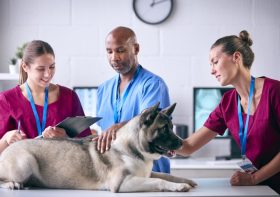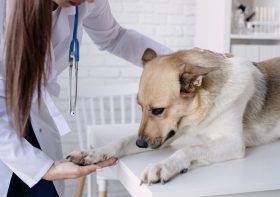Post-Operative Care Tips for Spayed and Neutered Pets

Firstly, kudos on being a responsible pet owner. Ensuring your pet’s smooth recovery post-surgery is crucial. Keep the surgical area clean and dry, following the vet’s instructions. Limit your pet’s activity to prevent strain on the wound. Provide a quiet, comfortable space for rest. Ensure they wear an E-collar to avoid licking or biting the incision. Administer medications as prescribed and monitor for any signs of infection or complications. Offer plenty of love and patience, and schedule follow-up appointments with your vet. Your attentive care aids a swift recovery.
Immediate Post-Surgery Care
Right after surgery, your pet might feel groggy due to anesthesia. It’s vital to keep things calm and quiet. Your furry buddy will need a comfortable space to rest. Here are some tips for the immediate post-surgery phase:
-
Monitor Them Closely: Keep an eye on your pet for any signs of distress or complications. Look out for symptoms like excessive swelling, bleeding, or lethargy.
-
Limit Activity: Avoid letting your pet jump, run, or play too vigorously. Minimizing physical activity helps the surgical site heal faster.
-
Follow Medication Instructions: Administer any prescribed medications as directed by your vet. Pain relief is crucial during the first few days.
-
Provide Fresh Water and Light Meals: Offer small amounts of water and food initially. Gradually return to their regular diet over a couple of days.
If your pet has undergone a neutering procedure, it’s essential to adhere to all post-surgery care instructions to ensure smooth recovery. Their neutering services often include detailed aftercare guidelines, so be sure to review these carefully and reach out to your vet with any questions.
Preventing Infections
A clean environment is key to keeping infections at bay. Here’s how you can do this:
-
Keep the Surgical Site Clean: Check the incision site daily for any signs of infection, such as redness or discharge.
-
Avoid Baths: Don’t bathe your pet until the vet gives it the all-clear. Moisture can introduce bacteria to the surgical site.
-
No Licking or Biting: Pets tend to lick their wounds, which can lead to infections. Consider using an Elizabethan collar to prevent this behavior.
Comfort and Pain Management
We understand that seeing your pet in discomfort can be tough. Here’s how you can help manage their pain and provide a comfy environment:
-
Comfortable Resting Area: Ensure your pet has a cozy, clean, and quiet place to rest. Soft bedding can add extra comfort.
-
Pain Relief: Stick to the vet’s medication plan for pain relief. Do not give them human painkillers; they can be harmful.
-
Use Cold Laser Therapy: Some vets recommend cold laser therapy to reduce pain and inflammation. It may speed up the healing process. For more information about how this treatment works, you can visit websites like https://www.collegeanimalhospital.com/site/veterinary-services-san-diego/cold-laser-therapy.
Food and Hydration
Proper nutrition and hydration are vital parts of your pet’s healing process:
-
Hydration: Make sure fresh water is always available for your pet. Dehydration can slow down healing.
-
Nutritious Diet: Stick to their regular diet unless advised otherwise by the vet. In some cases, they may recommend a special post-surgery diet.
-
Small Portions: Offer food in smaller, more frequent portions to avoid upsetting their stomachs.
Exercise and Activity Restrictions
It’s tempting to allow your pet to run around as they usually do, but restricted activity is important:
-
Limit Movement: To restrict your pet’s movements, keep it in confined spaces or use a leash when it’s outside.
-
Gradual Increase in Activity: Slowly reintroduce physical activities based on the vet’s recommendation.
Follow-Up Visits
Follow-up appointments are crucial for your pet’s recovery:
-
Vet Checkups: Schedule follow-up visits as advised to ensure the incision is healing well and there are no complications.
-
Address Concerns: Don’t hesitate to discuss any concerns you have during these visits. It’s better to be cautious.
-
Parasite Prevention: For more information about keeping your pet parasite-free, feel free to talk to your vet or see their website for further information about parasite prevention.
Importance of Vet Laboratory in Holistic Care
A vet laboratory plays a vital role in the holistic care of your pet. Here are some reasons why:
-
Accurate Diagnostics: Lab tests provide precise information about your pet’s health status, which aids in effective treatment planning.
-
Monitoring Recovery: Post-operative lab tests can monitor your pet’s recovery and catch any potential issues early.
-
Preventive Care: Regular lab tests can contribute to preventive health care by identifying issues before they become serious.
Why This Matters
Many pet owners overlook the importance of vet laboratories, but they are essential for a comprehensive health approach. Ensuring your pet gets the best possible care involves using available resources wisely, including veterinary labs.
Long-Term Care and Considerations
After the initial recovery, long-term care is also important:
-
Spay/Neuter Benefits: Spaying or neutering your pet provides exceptional health benefits, helping to reduce certain health risks and unwanted behaviors.
-
Monitor Weight: Spayed or neutered pets can be prone to weight gain. Monitor their diet and exercise to prevent obesity.
-
Regular Vet Visits: Continue with regular vet check-ups to ensure ongoing good health and catch any issues early.
Final Thoughts
Post-operative care for spayed and neutered pets involves a mix of immediate attention and long-term habits. From keeping an eye on the incision site to ensuring general well-being, each step plays a part in your pet’s recovery. Always stick to the vet’s advice, and don’t hesitate to ask questions if something doesn’t seem right. Taking these steps will ensure that your furry friend recovers quickly and remains healthy.


